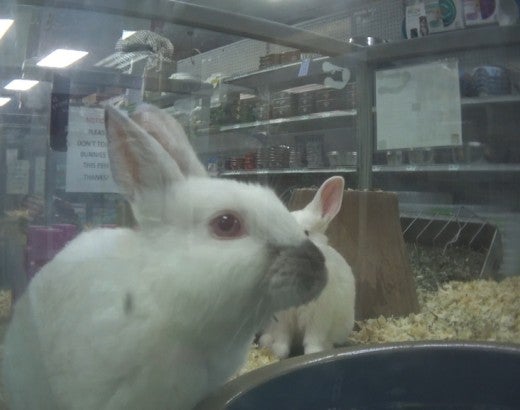In September last year, an HSUS undercover investigation of a Petland store in Frisco, Texas, a city in the Dallas-Fort Worth metropolitan area, revealed frail and ailing puppies, including some dogs too sick to eat and suffering from vomiting and diarrhea. Also among the gruesome discoveries was a dead rabbit in a freezer—the ailing animal was left to die at the store instead of being taken to a veterinarian.
Last week, in response to our investigation, the Frisco city council passed an ordinance that imposes stronger regulations on Petland’s and other pet stores’ sales of live animals. The ordinance addresses areas such as sanitation, veterinary treatment, care, feeding, housing and record-keeping on how Petland and other pet stores acquire and transport the animals they sell.
That is not a solution to the bigger problem of Petland selling dogs, most of whom are sourced from inhumane puppy mills, but it is a step in the right direction. It is also worth noting that the ordinance gives the city the right to pull a pet store’s permit if it violates the ordinance.
More dramatically, the nearby city of The Colony passed a ban on the retail sales of dogs and cats. The Colony currently doesn’t have any pet stores, but officials acted preemptively, out of concern that pet stores might try to open there.
The consumer drumbeat against Petland is growing louder elsewhere as well. This week more than 100 animal advocates showed up at a hearing on a proposed ban on puppy mill sales at pet stores in Cobb County, Georgia. The county is home to a Petland where we carried out an undercover investigation in 2018. Among the shocking findings at that store, our investigator learned from an employee that she sometimes came into work and saw puppies who had “passed away.” She also told our investigator that she tried hard to save the lives of puppies who were dying. Upon hearing these stories, our investigator looked into a suspicious black plastic bag in the freezer and found a dead puppy inside.
Both Cobb County and Naperville, Illinois, the site of a similar hearing last week, are expected to vote on their ordinances soon.
There are now 340 ordinances nationwide that prohibit pet store sales of puppy mill dogs, and two states, California and Maryland, have passed statewide laws ending such sales. A few weeks ago, Maine passed a law preventing the opening of any new stores that sell puppies. Five other states—Colorado, Massachusetts, New Hampshire, New York, Pennsylvania and Washington—are now considering legislation prohibiting the sales of dogs and cats in pet stores.
The writing is on the wall, but instead of cleaning house, Petland is focusing as it has in the past on fighting local and statewide efforts to stop the sale of puppy mill animals.
In Florida, the state where we’ve had more pet store puppy complaints than any other state, some lawmakers are now attempting to push forward a damaging preemption bill that would nullify 70 local laws already in place to end puppy mill sales in pet stores. Petland has already spent $160,000 on donations to Florida lawmakers. The Senate version of the bill—which also has a companion bill in the House—is scheduled for a committee hearing on Monday and we are working hard to ensure it doesn’t pass.
Our investigations of eight different Petland stores have revealed untold suffering for the animals in the pet store chain’s care. Since we began those investigations, hundreds of you have written in to tell us your own stories of beloved companion animals bought from Petland stores getting sick and/or dying. With growing awareness about the suffering of animals in puppy mills, consumers and pet stores are increasingly turning away from live animal sales and instead focusing on supporting adoptions from local shelters—a practice we have enabled and supported with our own HSUS Puppy Friendly Pet Stores program, which has already helped place more than 20,000 puppies and dogs from shelters in loving homes. It is time Petland too stops clinging to an outdated business model that only causes pain for animals and for consumers, and embraces a more humane approach that includes pet adoption.



